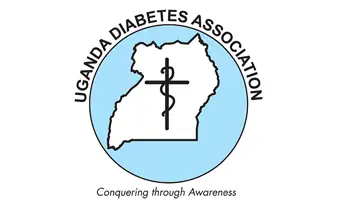
About
The Uganda Diabetes Association (UDA) is a non-governmental, not-for-profit organization that cares for, unites and advocates for people affected by or at risk of diabetes and their families in Uganda.
UDA was founded by Professor M.A. Otim in 1982 and inaugurated in 1983 by the late Vice President Paul Muwanga.
UDA is a member of the International Diabetes Federation (IDF), the Uganda Non-Communicable Disease Alliance (UNCDA) and the Ministry of Health Multi-Sectoral Committee on Non-Communicable Diseases.
We have 19 branches spread throughout Uganda – Entebbe, Jinja, Bugiri, Fort portal, Mbale, Soroti, Lira, Kabale, Mbarara, Arua, Mengo, Mityana, Mubende, Kitwe, Kawolo, Kayunga, Kiwoko, Kasese and Busiro East.
Vision: A Uganda with a reduced incidence of diabetes and an improved quality of life for people living with diabetes.
Mission: To prevent diabetes among the general public and improve the quality of life of people living with diabetes through health education and capacity building for health care personnel.
Our motto is “Conquering through awareness.”
Main Focus
- Creating awareness and knowledge about diabetes among the general public,
- Advocating for quality, evidence-based care among people living with diabetes
- Training health workers in evidence-based diabetes care.
- Research
Activities
- The Uganda Diabetes Association (UDA) helps people manage their diabetes effectively by providing information, advice, and support. We conduct health education talks during clinic days, camps, symposia, and on TV, radio, church and social media platforms.
- UDA trains health care workers in evidence-based management of diabetes through short courses, CPD, seminars and conferences.
- UDA conducts research to generate local data that can be used to contextualize diabetes management in our setting. Examples of research by UDA are the ACCORDAD and quality of diabetes care in Uganda studies.
- UDA is a key stakeholder in Ministry of Health activities. We are members of the National NCD Multi-Sectoral Committee, and recently we were part of the group that revised the Essential Medicines list for NCDs and the Uganda Clinical Guidelines 2023
- UDA enhances awareness among the general public about diabetes, its risk factors, symptoms and prevention.
Publications & Newsletters
Booklet and pamphlet “Living with Diabetes” for people with diabetes.
Message from the President
The African region has the greatest proportion of people with undiagnosed diabetes (66.7%). According to several community-based studies performed in rural and urban areas, the prevalence of diabetes in Uganda ranges from 0.4% to 9%. A recent steps survey has shown the prevalence of diabetes to be higher than 3%, and this shows a three-fold increase over the previous decade. It is worth noting that the prevalence is similar in rural and urban areas. Furthermore, 48% of people with diabetes in Uganda are not aware of their condition. This leads to late diagnosis and high rates of complications that are costly to manage. There is therefore a need to raise awareness about diabetes among the general public to increase detection rates and also empower people with diabetes with appropriate knowledge and self-care skills to delay or prevent the onset of complications.